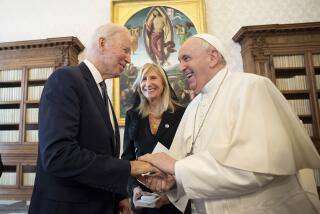S. Africa Stand Will Diminish Falwell’s Influence, Interfaith Leader Says
- Share via
The top executive of the National Council of Churches says that if the Rev. Jerry Falwell does not retreat from his energetic support of the South African government, Falwell will increasingly lose his influence.
“Falwell will either back off or history will pass him by,” predicted the Rev. Arie Brouwer, the council’s general secretary, during a recent interview.
Brouwer was in Los Angeles to talk with regional church and church council leaders. He took part in the services Sunday at First African Methodist Episcopal Church of Los Angeles.
Persistent Critic
The National Council of Churches, known for its liberal-to-moderate stances on social issues, has been a persistent critic of the Reagan Administration’s policies toward South Africa.
Brouwer contended that, while President Reagan “can say all sorts of things” about South Africa and still maintain his popularity, he doubted if Falwell will be able to do the same.
As an example, Brouwer cited the controversy last August after Falwell called Bishop Desmond Tutu, last year’s Nobel Peace Prize winner, “a phony.”
Falwell, after returning from a five-day trip to South Africa, had said that “if Bishop Tutu maintains that he speaks for the black people of South Africa, he is a phony.”
Apologized to Tutu
Later Falwell said he did not mean to impugn the anti-apartheid Anglican bishop as a person or a minister, and apologized if Tutu got that impression. Falwell, altering his statement slightly, said he meant that if Tutu “purports to speak for all of the blacks of South Africa, he is a phony.” Reagan later said he was pleased to see Falwell’s clarification and apology.
Since then, however, the founder-president of the Moral Majority political lobby has shown no signs of dropping the issue.
Recently, he circulated copies of a 16-page “special report” with color photos on his “fact-finding mission” to South Africa. It appears as an insert in his monthly Fundamentalist Journal and was mailed separately to some members of the press and religious institutions.
“I got one too,” Brouwer said.
Encourages Investment
In it, Falwell reiterates his stance, held by some nonwhite South African leaders as well, that withdrawal by American business from South Africa would harm prospects for ending apartheid reform, lead to bloodshed and open the doors to communist influence. President Pieter W. Botha is described as “the most progressive white leader ever on the issues of apartheid reform.”
The “Christian course of action” recommended in the Falwell report is prayer, education, contact with legislators and encouragement of financial investment in South Africa to provide employment benefits for blacks, coloreds and Indians. Falwell had said on Aug. 20 that he would urge his followers to buy more South African krugerrands. Reagan, under pressure from a stronger congressional bill, banned imports of the gold coins this month.
By contrast, the National Council of Churches has urged financial divestiture by U.S. firms.
The council, whose 31-member Protestant, Anglican and Orthodox denominations cooperate on a variety of social, worship, mission, relief and ecumenical projects, is only now getting out from under its own siege of controversy spawned in 1983 from evaluations by CBS’ “60 Minutes” and the Reader’s Digest. The council was criticized for its relationships with Marxist governments in Vietnam, Cuba and Nicaragua, but the council said the presentations were erroneous or distorted.
“People still remember it,” Brouwer said of the controversy. “But facts came to the fore and the emotions have been discharged. Some people (in the churches) may be a bit ashamed they became so upset.”
Films, TV Criticized
A council study group recently attempted to stir emotions on another matter--”violence and sexual violence” in the entertainment media. The committee’s 48-page report urged a restoration of the Federal Communications Commission’s role as overseer of broadcasting, among other recommendations. Brouwer gave the study qualified praise.
“It was strong on analysis of the situation and we still need to work out specific policy proposals,” he said. “The preoccupation of films and television with gratuitous sex and violence is only part of the problem.”
Brouwer said that over the next year or two, the council will develop a policy statement on which to base its lobbying efforts in Washington and advice to member denominations.
Brouwer, 50, was elected last fall to his post with the New York-based National Council of Churches after a brief term as a deputy general secretary for the World Council of Churches in Geneva.
Not long after taking over Jan. 1, the rail-thin, 6-foot-7 church official began implementing a reorganization plan for the council.
New Role for Top Deputy
He recently named the Rev. J. Martin Bailey, hired last May as a top deputy for liaison to the council’s 270-member governing board and member denominations, to also oversee the council’s research arm and information office. Religious News Service reported that the council’s information committee persistently questioned Brouwer and Bailey in a daylong meeting last month over whether council news would be reported “with integrity” before the appointment was approved.
Reflecting generally on his hope to bring change within the National Council of Churches, Brouwer said in Los Angeles that he was once chided when he was general secretary of the Reformed Church in America (1977-1983) about trying to maneuver the church body as if it were a rowboat.
“A colleague of mine said it was more like an aircraft carrier,” Brouwer said. “If so, then the National Council of Churches is a convoy.”
More to Read
Sign up for Essential California
The most important California stories and recommendations in your inbox every morning.
You may occasionally receive promotional content from the Los Angeles Times.













